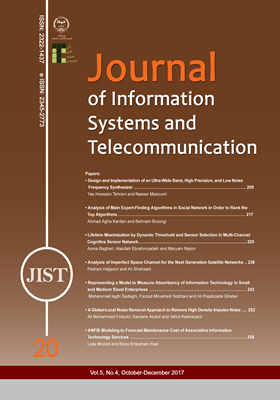Analysis of expert finding algorithms in social network in order to rank the top algorithms
محورهای موضوعی : Semantic Webاحمدآقا کاردان 1 , Behnam Bozorgi 2
1 - Assistant Professor
2 - Amirkabir University of Technology
کلید واژه: Expert-finding , Social Network Analysis , Question and answer community , Stack Overflow,
چکیده مقاله :
The ubiquity of Internet and social networks have turned question and answer communities into an environment suitable for users to ask their questions about anything or to share their knowledge by providing answers to other users’ questions. These communities designed for knowledge-sharing aim to improve user knowledge, making it imperative to have a mechanism that can evaluate users’ knowledge level or in other words “to find experts”. There is a need for expert-finding algorithms in social networks or any other knowledge sharing environment like question and answer communities. There are various content analysis and link analysis methods for expert-finding in social networks. This paper aims to challenge four algorithms by applying them to our dataset and analyze the results in order to compare the algorithms. The algorithms suitable for expert finding has been found and ranked. Based on the results and tests it is concluded that the Z-score algorithm has a better performance than others.
The ubiquity of Internet and social networks have turned question and answer communities into an environment suitable for users to ask their questions about anything or to share their knowledge by providing answers to other users’ questions. These communities designed for knowledge-sharing aim to improve user knowledge, making it imperative to have a mechanism that can evaluate users’ knowledge level or in other words “to find experts”. There is a need for expert-finding algorithms in social networks or any other knowledge sharing environment like question and answer communities. There are various content analysis and link analysis methods for expert-finding in social networks. This paper aims to challenge four algorithms by applying them to our dataset and analyze the results in order to compare the algorithms. The algorithms suitable for expert finding has been found and ranked. Based on the results and tests it is concluded that the Z-score algorithm has a better performance than others.
[1] Wei, Chih-Ping, et al. "Finding experts in online forums for enhancing knowledge sharing and accessibility." Computers in Human Behavior 51 (2015): 325-335. #
[2] Li, Xiu, et al. "A Service Mode of Expert Finding in Social Network." Service Sciences (ICSS), 2013 International Conference on. IEEE, 2013.#
[3] Kardan, Ahmad, Amin Omidvar, and Farzad Farahmandnia. "Expert finding on social network with link analysis approach." Electrical Engineering (ICEE), 2011 19th Iranian Conference on. IEEE, 2011.#
[4] Kardan, Ahmad, Mehdi Garakani, and Bamdad Bahrani. "A method to automatically construct a user knowledge model in a forum environment."Proceedings of the 33rd international ACM SIGIR conference on Research and development in information retrieval. ACM, 2010.#
[5] Liu, Duen-Ren, et al. "Integrating expert profile, reputation and link analysis for expert finding in question-answering websites." Information Processing & Management 49.1 (2013): 312-329.#
[6] Zhou, Guangyou, et al. "Topic-sensitive probabilistic model for expert finding in question answer communities." Proceedings of the 21st ACM international conference on Information and knowledge management. ACM, 2012.#
[7] Zhu, Hengshu, et al. "Ranking user authority with relevant knowledge categories for expert finding." World Wide Web 17.5 (2014): 1081-1107.#
[8] Zhou Zhao; Lijun Zhang; Xiaofei He; Ng, W., "Expert Finding for Question Answering via Graph Regularized Matrix Completion," Knowledge and Data Engineering, IEEE Transactions on , vol.27, no.4, pp.993,1004, April 1 2015.#
[9] Y. Peng, A. Ganesh, J. Wright, W. Xu, and Y. Ma. Rasl: Robust alignment by sparse and low-rank decomposition for linearly correlated images. Pattern Analysis and Machine Intelligence, IEEE Transactions on, 34(11):2233–2246, 2012.#
[10] R. Salakhutdinov and N. Srebro. Collaborative filtering in a nonuniform world: Learning with the weighted trace norm. tc (X), 10:2, 2010.#
[11] Bouguessa, Mohamed, Benoît Dumoulin, and Shengrui Wang. "Identifying authoritative actors in question-answering forums: the case of yahoo! answers." Proceedings of the 14th ACM SIGKDD international conference on Knowledge discovery and data mining. ACM, 2008.#
[12] C.S. Campbell, P.P. Maglio, A. Cozzi and B. Dom. Expertise Identification using Email Communication. Proceedings of the 12th ACM International Conference on Information and Knowledge Management (CIKM’03), pages 528-531, 2003.#
[13] B. Dom, I. Eiron, A. Cozzi and Y. Zhang. Graph-Based 8th Ranking Algorithms for E-mail Expertise. Proceedings of ACM SIGMOD Workshop on Research Issues on Data Mining and Knowledge Discovery (DMKD’03), pages 42-48, 2003.#
[14] Xu, Fei, Zongcheng Ji, and Bin Wang. "Dual role model for question recommendation in community question answering." Proceedings of the 35th international ACM SIGIR conference on Research and development in information retrieval. ACM, 2012.#
[15] Riahi, Fatemeh, et al. "Finding expert users in community question answering." Proceedings of the 21st international conference companion on World Wide Web. ACM, 2012.#
[16] Page, L., Brin, S., Motwani, R. and Winograd, T. "The pagerank citation ranking: Bringing order to the web". Technical report, Stanford Digital. Library Technologies Poject, 1998.#


